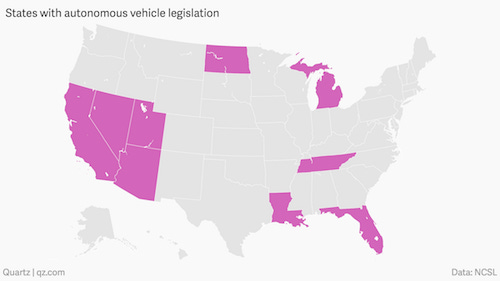Obama unveils self-driving car rules, Airbnb makes nice with landlords, and Lyft as the “ultimate subscription”
XXVIII
On the road.
Here is an op-ed from Barack Obama on our nation’s driverless future. It comes as his administration releases the first safety guidelines for autonomous vehicles, and one week after Uber showed off its self-driving cars in Pittsburgh. The guidelines “signaled to motorists that automated vehicles would not be a Wild West where companies can try anything without oversight,” reports the New York Times, “but were also vague enough that automakers and technology companies would not fear overregulation.” This line is walked in Obama’s op-ed as well. “Government sometimes gets it wrong when it comes to rapidly changing technologies,” he writes. “That’s why this new policy is flexible and designed to evolve with new advances.”
The guidelines will supplement rules on driverless technologies that so far have come at the state level. The most transformative legislation yet was enacted in Florida this summer, making the Sunshine State the only one in the US to allow fully autonomous vehicles on public roads without a driver behind the wheel. For more on that, see this good piece in Quartz today from my coworker Michael Coren, “How Florida became the most important state in the race to legalize self-driving cars.”
State-level rules are at best a temporary fix while automakers and tech companies road test driverless technologies. In the not-too-distant future, if you believe the most bullish forecasts, such vehicles will be ferrying around passengers on the regular and will inevitably need to cross state lines, making standardized regulations essential. The new guidelines from the Department of Transportation, which went online this morning, are a first step toward that. “What we are trying to do is avoid a patchwork of state laws,” says DOT secretary Anthony Foxx.
Ultimate subscription.
In other self-driving things, here is a blog post from Lyft co-founder John Zimmer on how autonomous vehicles will transform transportation “into the ultimate subscription service.” The post is long at nearly 4,000 words or an estimated 17-minute reading time on Medium. It is full of wandering memories (“I remember when I first fell in love with cars. It started small with Hot Wheels when I was three”) and indulgent clichés (“Next time you walk outside, pay really close attention to the space around you.”) Writing aside, though, what I found oddest about this post was that in all of its nearly 4,000 indulgent rambling words, only two of them were “General Motors.” As you might recall, Lyft secured a $500 million investment from GM in January and partnered with the automaker to create an “autonomous on-demand network.” At the time, Zimmer said partnering with GM made “a lot of sense” for a startup that has “never produced cars before.” Right, exactly. Lyft has never produced cars. And unlike Uber, it also hasn’t invested any resources in bringing aboard people who have? As far as I am aware, Lyft is relying entirely on GM for the “driverless car” part of its driverless future. Perhaps that merits more than two words in a treatise on “the road ahead.”
Elsewhere: Uber opens facility in Detroit area to boost collaboration with car companies.
Friendly Building Program.
This is a little old, but I missed it while in Pittsburgh last week. Airbnb is working on a new program to encourage landlords to let their tenants participate in home-sharing—something that could dramatically expand Airbnb’s listings, especially in densely populated cities. The basic idea is that landlords, Airbnb, and tenants would collaborate to create home-sharing rules for the building that everyone is comfortable with. Landlords would also share in the revenue earned by their tenants with a standard cut of 5-15% and Airbnb would handle all of the payments. By far the best part of this initiative is its name—the “Airbnb Friendly Building Program”—because let us never forget that Airbnb is a friendly unicorn. To help keep it that way, the program is being made available to building owners only in areas where short-term home rentals are explicitly legal (so, for example, Philadelphia and Nashville, but not New York). The program is also currently restricted to market-rate units, because friendly unicorns don’t embolden landlords and their tenants to use rent-regulated housing for sketchy profit schemes.
Dining disruptions.
Rising rents and competition from tech companies with dreams of gourmet catering and unlimited budgets have created a dire situation for Silicon Valley’s restaurants, reports the New York Times. That may very well be a good thing for the best cooks, dishwashers, and servers, but it’s been hard on restauranteurs who don’t have millions in venture capital to draw on:
With razor-thin profit margins, restaurateurs find they can increase wages only so much. Paying a livable wage is a struggle in Palo Alto, where the average one-bedroom apartment rents for $2,800, the same as in New York City, according to Rent Jungle. Workers have also been driven out of surrounding towns that were previously affordable, like Cupertino and San Jose, where demand from a new influx of tech workers has driven up the average cost of a one-bedroom apartment to more than $2,500.
It’s also created a void for residents who don’t have hundreds of dollars to spend on a meal, or access to the Palantir cafeteria:
Walk around downtown Palo Alto and you will probably stumble on an enticing dining space where seasonal menus with dishes like Cuban braised pork tease passers-by. But do not try to enter without a badge. The space is Palantir Technologies’ private, fully staffed, employee-only cafeteria. The privately held software company now occupies over 12 percent of the rentable commercial office space downtown, according to the research firm PrivCo.
Related: The Thrill of Losing Money by Investing in a Manhattan Restaurant.
Other stuff.
Uber suspends surge in Chelsea. Uber Nears Settlement After Pocketing Half of Drivers’ Tips. Lyft accused of overcharging on E-ZPass. Didi users complain about prices. Self-driving Ubers are ok while they’re free. Uber maps London. Uber spams London. Uber fuels attacks in South Africa. Racism on Airbnb threatens friendship. Rent cheap homes on Airbnb. Grab raises $750 million. Lyft sets up in Crystal City. DC attorney general investigates Handy. Walmart completes Jet acquisition. Airbnb buys Trip4Real. Ditch TaskRabbit and Do Your Own Laundry. Instacart CEO says Instacart is fine. Amazon’s UK grocery price war. Sharing economy companies pay well. Jeb Bush drives for Uber. DJ Khaled does undercover Lyft. Upfront Car Finance. Tesla’s crashes. Express Pay. HAMILTON16.





